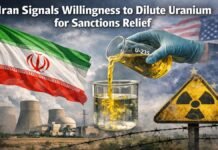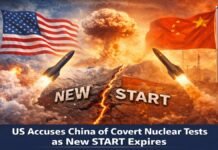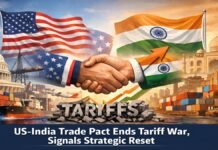
Key Points:
- Historic Tariff Announcement: President Trump unveiled reciprocal tariffs on 60 countries, with rates ranging from 10% to 49%, effective immediately.
- India Faces 26% Tariff: India’s imports are hit with a 26% tariff, half of the 52% levies it imposes on U.S. goods.
- Auto Sector Impact: A 25% tariff on foreign-made automobiles begins April 3, aiming to bolster domestic manufacturing.
- Economic Freedom Vision: Trump calls this policy a step toward American economic independence and revitalization.
Washington: In a landmark move, U.S. President Donald Trump declared April 2, 2025, as Liberation Day, unveiling sweeping reciprocal tariffs aimed at rebalancing global trade. The tariffs, which range from a baseline of 10% to as high as 49%, target nations that Trump claims have exploited American trade policies for decades. This bold initiative marks one of the most significant shifts in U.S. trade strategy since World War II.
Details of the Tariff Plan
Trump’s new tariff regime imposes tailored rates based on perceived trade imbalances:
- India: 26% tariff (half of the 52% levied by India on U.S. goods).
- China: 34% tariff, adding to existing duties imposed for fentanyl-related issues.
- European Union: 20% tariff.
- Japan: 24% tariff.
- Vietnam and Cambodia: Among the highest rates at 46% and 49%, respectively.
The tariffs aim to counteract unfair trade practices, including currency manipulation and restrictive regulations that limit U.S. exports. Goods from countries like Canada and Mexico remain exempt under USMCA-compliant agreements.
Auto Sector Tariff
A major highlight is the implementation of a 25% tariff on foreign-made automobiles starting April 3. This policy is designed to protect domestic manufacturers and reduce reliance on imported vehicles, which account for nearly three-quarters of the U.S. auto market.
Trump’s Vision for Economic Independence
During his announcement at the White House Rose Garden, Trump described the day as a turning point in American history:
“This is Liberation Day the day we reclaim our destiny and make America wealthy again. For over 50 years, foreign nations have pillaged our economy, but today marks the end of that era.”
Trump emphasized that reciprocal tariffs will treat other nations as they treat the U.S., urging them to lower their own barriers if they want reduced rates in return. He also encouraged foreign companies to relocate their manufacturing operations to America, promising zero tariffs for products made domestically.
Impact on Global Trade
The tariffs are expected to disrupt international supply chains and provoke retaliatory measures from affected nations. Economists warn that these policies could lead to higher consumer prices in the U.S., exacerbate inflation, and strain global economic growth. Kristalina Georgieva, Managing Director of the IMF, cautioned against potential ripple effects that could destabilize developing economies reliant on U.S. trade.
India’s Response
India is among the countries most affected by the new tariffs but has adopted a measured response. Commerce Minister Piyush Goyal recently visited Washington to negotiate exemptions and discuss a bilateral trade agreement aimed at mitigating long-term impacts. Analysts suggest India could benefit from supply chain shifts in sectors like electronics and textiles as companies seek alternatives to heavily taxed nations.
Stock Market Reaction
The announcement triggered volatility in global markets:
- The S&P 500 futures dropped by 1.7%.
- Nasdaq futures fell by 2.5%.
- Tesla shares rebounded by 3%, reflecting optimism about reduced competition from foreign automakers.
Trump’s Liberation Day tariffs signal a bold attempt to reshape global trade dynamics while prioritizing American industry and economic sovereignty. While supporters hail it as a necessary step toward fairness, critics warn of potential economic fallout both domestically and internationally. As these policies take effect, all eyes will be on how global partners respond and whether this move truly ushers in a new era of American prosperity or ignites a prolonged trade war.





















































